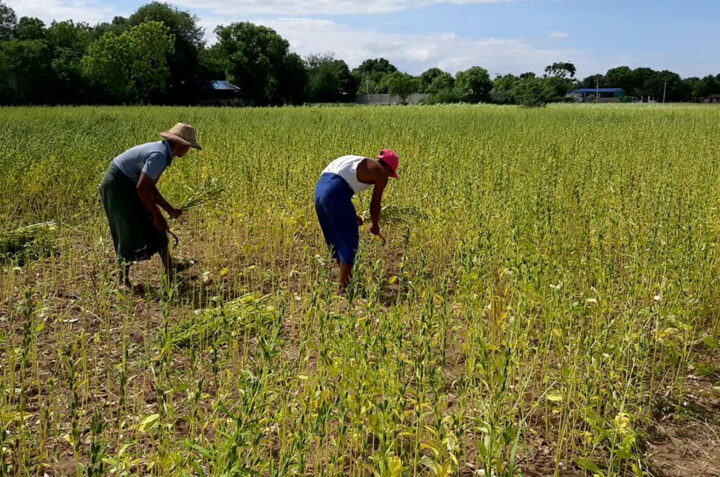The raw sesame, peanut import proposal caused price shakeup in the domestic market
18 Nov 2020
The news of a company’s import proposal for raw sesame and peanut makes changes in pricing in the local market, said U Htay Chun, Vice Chairman of Mandalay Depot. “The Ministry of Commerce reported that a certain company had sought import permit for raw sesame and peanut to be produced on a CMP basis and re-exported to foreign markets. The news shook up the pricing, with black sesame dropping to K180,000-150,000 from over K200,000 per three-basket bag. The market will be competitive as the imported sesame is priced cheaper. However, it will undoubtedly harm the interest of the growers. Consequently, the domestic sesame will be offered a low price,” he elaborated.
The Ministry of Commerce asked the opinions of Myanmar Pulses, Beans and Sesame Seeds Merchants Association regarding the importation proposal of 10,500 tonnes of raw sesame and 32,000 tonnes of peanuts under zero tariff. As it could harm the interest of the local growers, the association has forwarded this news to the respective depots where sesame and peanut are primarily traded and has asked for their opinions.
“Myanmar’s peanuts fetch a good price in China due to the high quality and good taste. The peanut from India is about US$100 cheaper than those in China. Furthermore, as it will be produced on a CMP basis, the tax exemption is also requested. Myanmar grants tax-exempt on raw material import if the goods are exported with a few exceptions. Myanmar’s peanut is priced K3,200 per viss (a viss equals to 1.6 kg), while the peanuts from China fetches K2,400 per viss. Myanmar’s peanut is of high quality with the use of natural fertilizer. Myanmar peanuts are offered 200 Yuan higher than those produced in China. The import news drove the price cool, and the buyers are closely observing the market,” he continued.
Myanmar shipped over 150,000 tonnes of sesame in the previous financial year 2019-2020, generating an export value of US$240 million, the Commerce Ministry’s data showed. Typically, Myanmar exports about 80 per cent of sesame production to foreign markets. China is the primary buyer of Myanmar sesame, which is also shipped to markets in Japan, South Korea, China (Taipei), UK, Germany, the Netherlands, Greece, and Poland among the EU countries. The EU markets prefer organic-farming sesame seeds from Myanmar, said an official from the Trade Promotion Department. Japan prefers Myanmar black sesame seeds, cultivated under good agricultural practices (GAP), and purchases them after a quality assessment. Black sesame seeds from Myanmar are also exported to South Korea and Japan. Meanwhile, China buys various coloured sesame seeds from the country. This year, Japan has not purchased Myanmar’s sesame yet.
For the current budget year 2020-2021, Myanmar traders target to export over 130,000 tonnes to foreign partners, traders from Mandalay market said. Sesame is cultivated in the country throughout the year. Magway Region, which has gained a reputation as the oil pot of Myanmar, is the leading producer of sesame seeds. The seeds are also grown in Mandalay and Sagaing regions.
Of the cooking oil crops grown in Myanmar, the acreage under sesame is the highest, accounting for 51.3 per cent of the overall oil crop plantation.
The volume of sesame exports was registered at over 96,000 metric tons, worth $130 million, in the financial year 2015-2016; 100,000 tonnes, worth $145 million, in the 2016-2017FY; 120,000 tonnes, worth $147 million, in the 2017-2018FY; 33,900 tonnes valued $43.8 million in the 2018 mini-budget period, and 125,800 tonnes, worth $212.5 million in the 2018-2019FY, the trade data of Central Statistical Organization indicated. — Hteik Htar Naing, Ko Htet (Translated by Ei Myat Mon)
(The Global New Light of Myanmar: https://www.gnlm.com.mm/raw-











